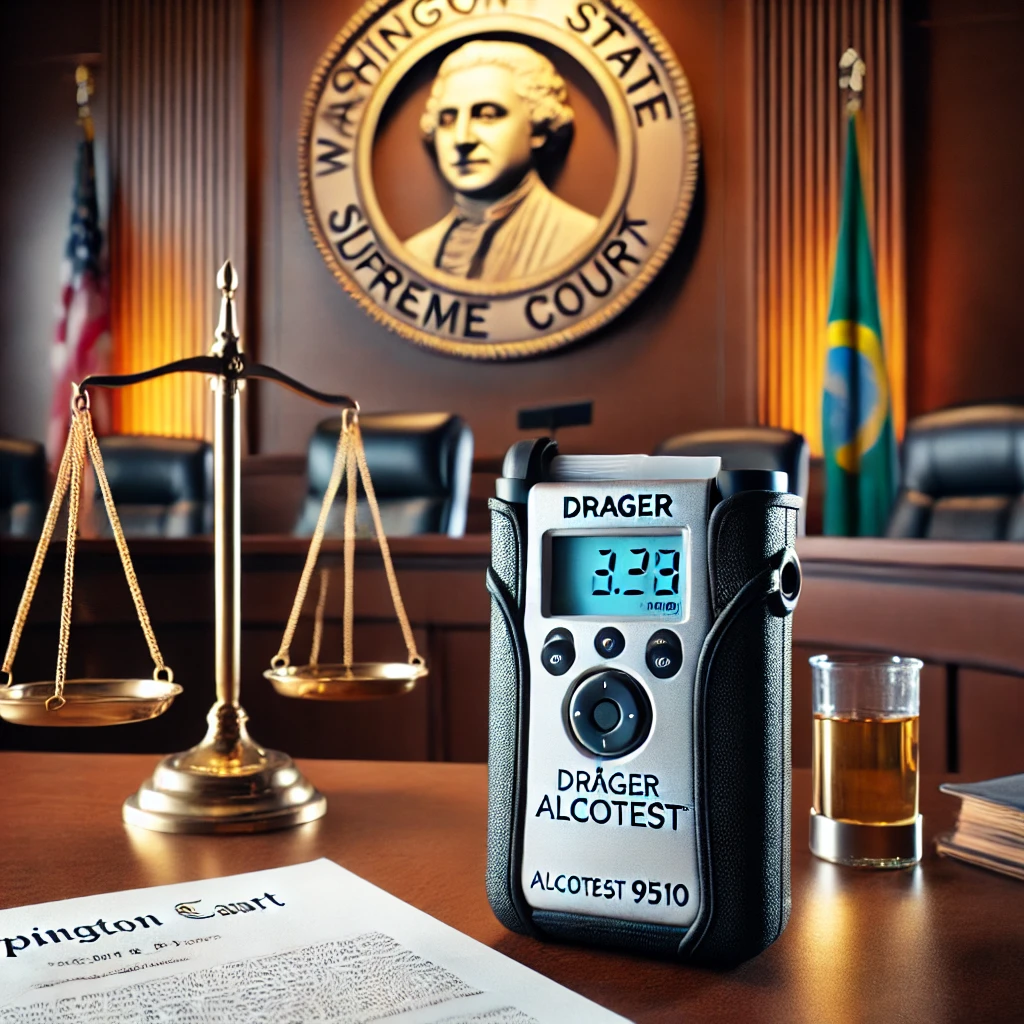In the case of State v. Austin River Keller, the Washington Supreme Court addressed the issue of breath test admissibility, specifically focusing on the Dräger Alcotest 9510 breath test machine used in DUI cases. The case revolved around Keller’s arrest for driving under the influence (DUI) and the admissibility of his breath alcohol test results in court.
Facts of the Case
On May 9, 2020, Austin River Keller drove his vehicle into a ditch in Bremerton, Washington. When law enforcement arrived on the scene, Keller admitted he had been driving the car. During the investigation, officers detected the smell of alcohol and conducted field sobriety tests, which Keller did not pass completely. Subsequently, Keller was arrested and taken to a police station, where he submitted to a breath test using the Dräger Alcotest 9510 machine.
Keller’s breath test showed alcohol concentrations of 0.117 and 0.116, well above the legal limit of 0.08 as per RCW 46.61.502. Based on these results, Keller was charged with DUI. However, Keller moved to suppress the breath test results, arguing that the Dräger machine did not comply with the specific requirements outlined in Washington law.
Legal Background on Breath Test Admissibility
The admissibility of breath test results in Washington is governed by RCW 46.61.506, which sets strict criteria for the validity of breath tests in DUI cases. The statute requires that breath tests be performed using methods approved by the state toxicologist, and the results must meet certain accuracy standards. Specifically, the test results must agree within plus or minus 10 percent of their mean, determined by the method approved by the state toxicologist.
At issue in Keller’s case was whether the Dräger machine complied with the requirement to round the mean of the breath test results to four decimal places before calculating the plus or minus 10 percent range, as outlined in the now-amended WAC 448-16-060.
The District Court’s Decision
The Kitsap County District Court ruled in favor of Keller, suppressing the breath test results. The court found that the Dräger machine did not properly round the mean of the test results before calculating the plus or minus 10 percent range. As a result, the court concluded that the test results were invalid under RCW 46.61.506 and the relevant Washington Administrative Code (WAC) provisions.
The district court held that the Dräger machine’s failure to follow the rounding method outlined in the statute and WAC rendered the breath test results inadmissible. This ruling had significant implications, as it affected not only Keller’s case but also all other DUI cases in Kitsap County where the Dräger machine was used.
The Washington Supreme Court’s Ruling
The Washington Supreme Court reversed the district court’s ruling. The Supreme Court held that the relevant statutes and regulations, including RCW 46.61.506, do not require the Dräger machine itself to perform the rounding and calculation at the time of the test. Instead, the court found that the State could establish the required foundation for admitting breath test results by performing the necessary calculations manually or through expert testimony at trial.
The court clarified that the foundational requirements for breath test admissibility can still be met as long as the test results fall within plus or minus 10 percent of their mean, even if the Dräger machine did not perform the calculations itself. This ruling reinstated the use of breath test results from the Dräger machine in DUI cases.
Implications of the Ruling
This ruling has significant implications for DUI prosecutions across Washington State. By clarifying that the breath test machine does not need to perform the rounding and calculation at the time of the test, the Washington Supreme Court has upheld the validity of breath tests conducted using the Dräger Alcotest 9510, provided the State can demonstrate compliance with the relevant standards through other means.
For individuals facing DUI charges, this ruling emphasizes the importance of ensuring that all technical and procedural aspects of breath tests are thoroughly reviewed. If you or someone you know has been charged with a DUI or needs legal representation, it’s crucial to seek experienced legal counsel.
Contact Blanford Law for Your Legal Needs
At Blanford Law, we believe in providing every client with the best legal representation available. With more than 20 years of experience, Ken Blanford is a no-nonsense, relentless, and fair advocate for his clients. We are great listeners and believe that every client deserves respect without preconceived notions.
For more information on how we can help, visit our client resources or contact us anytime at 253-720-9304 or by email at info@blanfordlaw.com.
Conclusion
The State v. Keller case serves as a critical example of how breath test results are evaluated under Washington law, particularly for DUI cases involving the Dräger Alcotest 9510 machine. The Washington Supreme Court’s decision to reverse the district court’s suppression of the breath test results clarifies the legal standards that must be met for the admissibility of such evidence. If you or someone you know is accused of DUI, contact Blanford Law for a consultation.
By staying informed about the latest rulings and legal standards, you can ensure that your rights are protected in any legal proceeding.

